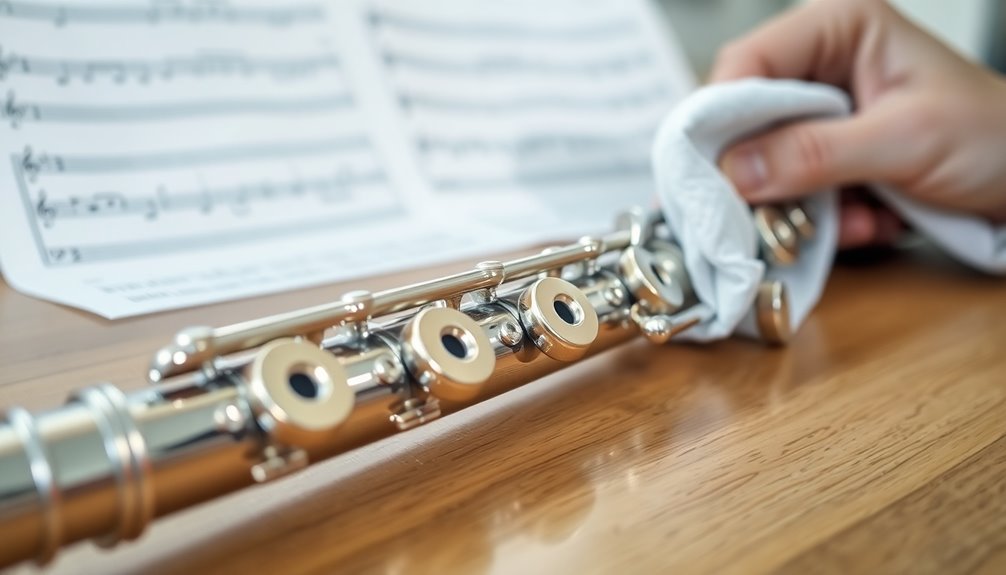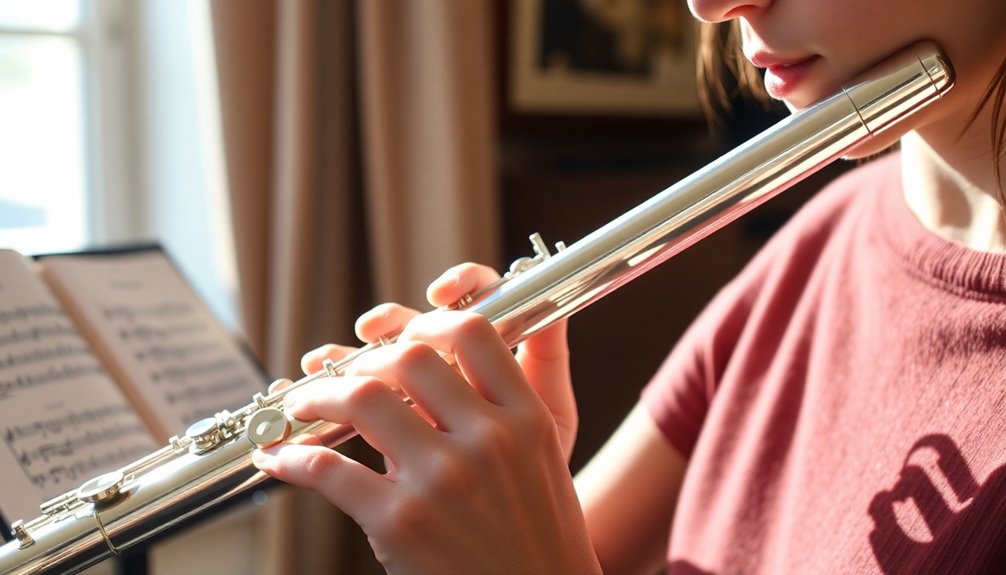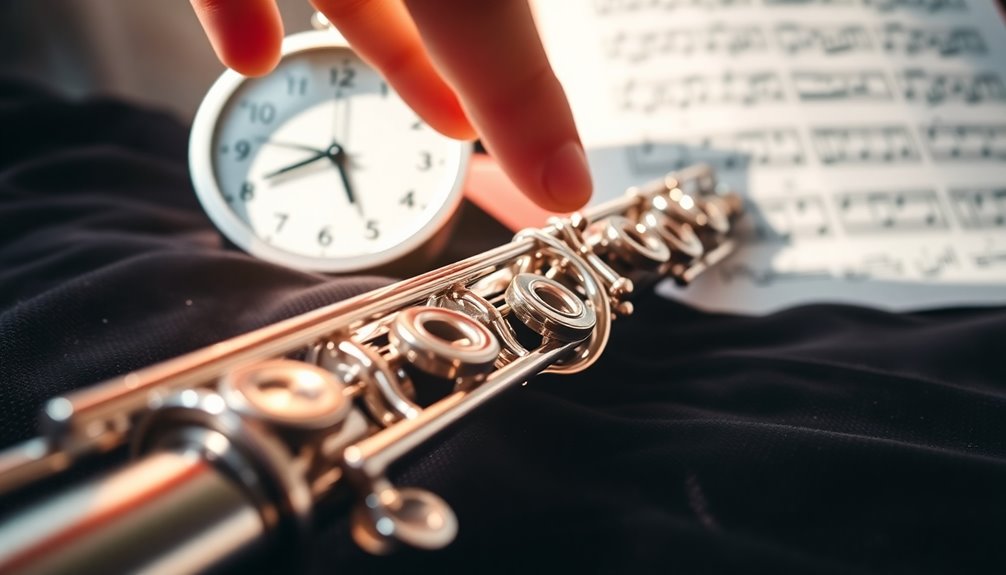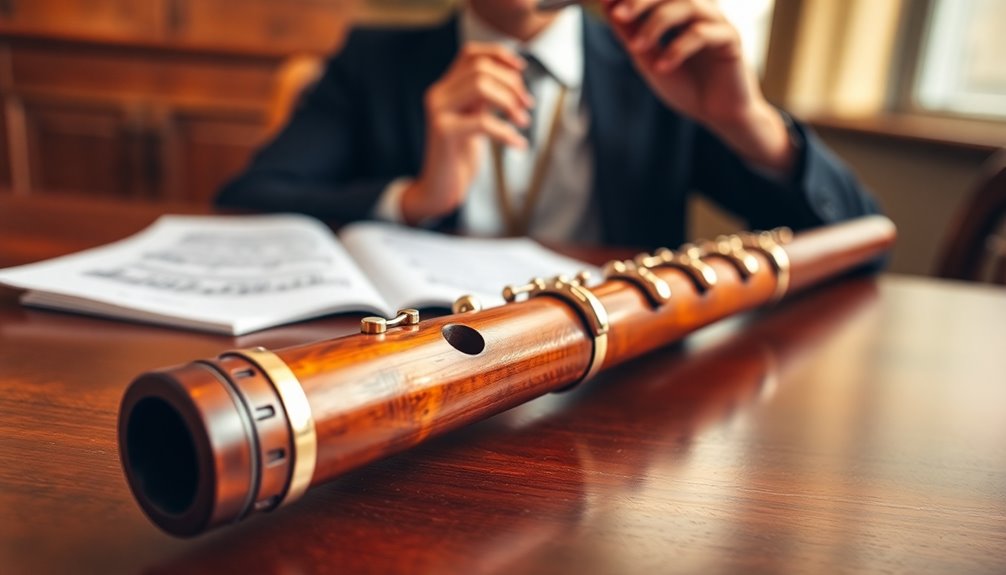If your flute won't play high notes, start by checking its condition for any visible damage, leaks, or misaligned keys. Next, review your technique—relax your fingers, engage your diaphragm for breath support, and experiment with your embouchure to find the best position for high notes. Always warm up properly with long tones and scales to build your confidence. Don't hesitate to seek guidance from a qualified teacher or a flute repair technician, as even minor adjustments can make a significant difference. You'll discover valuable insights to help you release your instrument's full potential.
Key Takeaways
- Inspect the flute for visible damage, especially dents or scratches that may affect sound quality in high notes.
- Check pads for wear or leaks; worn pads can hinder high note performance.
- Ensure proper finger positioning and smooth key action to avoid air leaks.
- Experiment with your embouchure and head angle to improve tone clarity for high notes.
- Seek guidance from a qualified flute teacher or technician for personalized assistance and adjustments.
Check Your Flute Condition

Before diving into high notes, it's essential to verify your flute is in top condition. Start with some basic flute maintenance to guarantee everything is functioning properly. Check for any visible damage, like dents or scratches, that can affect sound quality.
Pay close attention to the pads; if they're worn or leaking, they'll hinder your ability to reach those higher pitches.
Next, focus on key alignment. Misaligned keys can cause air leaks, making it nearly impossible to hit high notes. Gently press each key to see if it responds smoothly without sticking. If you notice any irregularities, it might be time to consult a professional repair technician who can make the necessary adjustments.
Finally, give your flute a good clean. Use a cleaning rod and cloth to remove moisture after each practice session, preventing buildup that can compromise sound quality. Regular cleaning enhances instrument longevity and ensures optimal performance.
You're part of a community of flute players who understand the importance of maintaining your instrument. By taking these steps, you'll not only enhance your performance but also foster a deeper connection with your music.
Review Your Technique

When aiming for high notes, it's important to review your technique alongside your flute's condition. Start by examining your finger positioning. Make sure your fingers are relaxed and hovering just above the keys. Tight fingers can hinder your ability to play smoothly, so practice lifting and lowering them gently.
Next, focus on your breath support. High notes require a steady and controlled airstream. Instead of forcing the air, engage your diaphragm for more support. Take deep breaths, letting your abdomen expand, and then release that air in a focused manner.
Experiment with different embouchures too. A small, tight aperture can help with high notes, so adjust your lips to find the sweet spot that works for you. Remember, it's all about balance and control. Additionally, maintaining a strong embouchure is crucial for achieving those higher pitches effectively.
If you feel frustrated, don't worry—everyone goes through this. Keep practicing, and consider recording yourself to pinpoint areas for improvement. Surround yourself with supportive musicians, and don't hesitate to ask for feedback.
You belong in this community, and with patience and dedication, you'll reach those soaring high notes.
Warm Up Properly

Having a solid technique is just the beginning; warming up properly can make a significant difference in your ability to hit those high notes. Start each practice session with dedicated flute exercises that focus on flexibility and range. These exercises not only prepare your fingers but also help you develop the necessary breath control essential for achieving those soaring pitches.
Begin with long tones, sustaining notes at various pitches. This will help you feel the airflow and engage your diaphragm. As you progress, incorporate scales, focusing on smooth shifts between notes. Don't rush; take your time to guarantee each note is clear and resonant.
Remember, warming up isn't just about the notes; it's about building confidence. As you see your abilities improve, your anxiety about hitting high notes will decrease. Embrace this time as a chance to connect with your instrument and yourself. Additionally, incorporate diaphragmatic breathing into your warm-up to enhance tone quality and support your high note playing.
Invite fellow flutists to join you in warm-up sessions, sharing tips and celebrating achievements together. This sense of community can boost your motivation and belief in your skills.
Experiment With Embouchure

Embouchure plays an essential role in your ability to reach those high notes effectively. To improve your sound, start by making some embouchure adjustments. Focus on your lip positioning; your bottom lip should slightly roll over your bottom teeth while your top lip remains firm but relaxed. This balance is vital for achieving clarity in those higher pitches.
Try experimenting with the angle of your head and the direction your air stream is aimed. A slight upward tilt can help direct the air more efficiently. Take time to feel how these adjustments affect your tone. You might find that shifting your lips just a bit can reveal those elusive high notes.
Don't be afraid to practice in front of others or record yourself. Listening back can reveal insights about your sound that you might miss in the moment. Additionally, maintaining a strong embouchure technique is crucial for navigating the instrument's range effectively.
Seek Professional Guidance

Sometimes, a fresh perspective from a professional can make all the difference in your quest for high notes on the flute. If you've tried adjusting your embouchure and still struggle, it might be time to seek guidance from an expert.
A qualified flute teacher can provide tailored music lessons, helping you refine your technique and build confidence.
Additionally, consider consulting a skilled flute repair technician. They can check for any mechanical issues that might be hindering your instrument's performance.
Sometimes, a simple adjustment or repair can reveal those elusive high notes.
When you invest in professional help, you're not just improving your playing; you're also becoming part of a community of musicians who share your passion.
Embrace the opportunity to learn from those with experience. Don't hesitate to ask questions and seek advice. Moreover, choosing a reputable brand like Yamaha Flutes can further enhance your experience, as their quality construction supports clear sound production.
Frequently Asked Questions
Can Environmental Factors Affect My Flute's High Note Performance?
Yes, environmental factors can definitely affect your flute's high note performance.
Humidity levels can cause changes in the pads and tone holes, impacting sound quality. Similarly, temperature fluctuations can cause your flute to expand or contract, affecting pitch and ease of play.
To guarantee peak performance, try to keep your flute in a stable environment.
With a little care and attention, you'll be able to enjoy those high notes with confidence!
How Often Should I Clean My Flute for Optimal Performance?
When you're ready to jam, keeping your flute in prime condition is essential.
For best performance, clean your flute after every session using proper cleaning techniques, like swabbing and wiping down the exterior.
Regular flute maintenance not only prolongs its life but also enhances its sound quality.
Aim for a deeper clean every few weeks, focusing on the pads and keys.
Trust me, your flute will thank you, and you'll sound even better!
Is My Flute Brand Influencing My Ability to Play High Notes?
Your flute brand can definitely influence your ability to play high notes.
Different flute brands offer varying sound quality and construction, which can affect your performance. If you're struggling, consider trying flutes from reputable brands known for their high register capabilities.
Don't hesitate to explore options and seek advice from fellow musicians. The right instrument can enhance your confidence and help you feel more connected to your music community.
Keep experimenting!
What Role Does Mouthpiece Shape Play in Hitting High Notes?
You might think mouthpiece shape doesn't matter much, but it plays a vital role in hitting high notes.
The mouthpiece dimensions can affect your airflow and how well you control your embouchure. By experimenting with different shapes, you can discover what feels best for you.
Don't hesitate to make embouchure adjustments based on the mouthpiece you're using.
Are There Specific Exercises for Improving High Note Range on the Flute?
To improve your high note range, you can try specific high note exercises that focus on breath control and embouchure adjustment.
Start with long tones in higher registers, gradually increasing your pitch. Incorporate scales and arpeggios, focusing on clarity and consistency.
Remember, range development takes time, so be patient with yourself. Celebrate small victories, and enjoy the journey.
You're not alone in this; many flutists share the same goal of reaching those high notes!
Conclusion
If you're struggling to hit those high notes on your flute, don't get discouraged! Proper maintenance and technique can make all the difference. Remember, studies show that 70% of flute players face similar challenges at some point, so you're certainly not alone. Keep experimenting with your embouchure and warming up, and don't hesitate to seek help from a professional. With persistence and practice, you'll be soaring through those high notes in no time!






